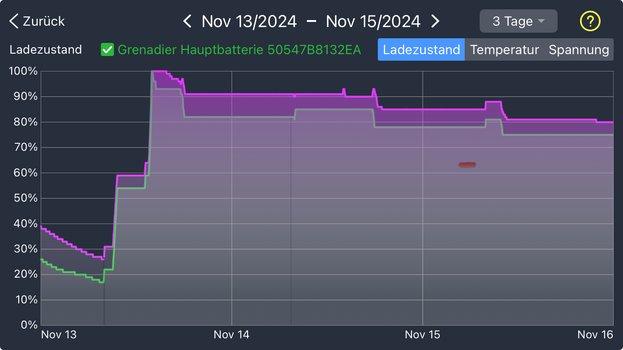Hi all
I experience the following symptoms with my factory dual battery setup.
Note: I ride around with a ARB fridge pretty much permanently connected and on. So I am inadvertantly testing the system long term.
Symptoms:
The battery charge display reports my SOC as 63% with a charge current of 3A. Sometimes this setpoint moves, the highest I have seen it at is 83%.
Initially, the charge current is very large (>80A) but quickly drops to these trickle charge levels.
My Point of View to Ineos:
I am ignoring the fact that the dual battery setup architecture is not what we would typically prefer in the South African and Australian markets (probably elsewhere).
The selected architecture does not isolate the primary and secondary battery to create two 12 DC buses. It effectively combines the two batteries in a 200 aH battery by connecting the two batteries in parallel. This means that the secondary battery has to have the same chemistry as the primary battery. It also implies that the charge current and SOC we see on the screen is that of the combined 200 aH battery. Again, this post is not about this architecture choice.
The symptoms I experience whereby my charging system thinks it's job is done at 63% SOC is effectively limiting me to use 13% of my 200aH battery. This is because the effective deep-level discharge of the provided batteries is 50% (confirmed by the multiple alarms I have experienced). This renders the system inadequate for propper overlanding use where I would typically have lights etc. in addition to my fridge.
I believe what I bought was meant for overlanding and now Ineos seems to be implying this system objective is to help the vehicle start.
The solution/blame does not lie in fiddling with the provided battery combiner as it is not responsible for charging the battery. The battery is charged by the smart alternator which is controlled by the system software (which I think is provided by BMW).
The variable setpoint experience I have had indicates a bug.
The lower than 100% SOC setpoint indicates some attempt to protect the batteries.
My Experience with Ineos:
My vehicle has been in 4 of 5 times for this issue. Both batteries have been replaced. Generally, the local dealer has no idea how the electrics work, which I suspect is a training issue from Ineos.
This week an "expert" looked at my vehicle and took measurements on his way back to Europe.
Based on my local support people's response when picking up the car they are going to tell me it works as designed
My Request:
I experience the following symptoms with my factory dual battery setup.
Note: I ride around with a ARB fridge pretty much permanently connected and on. So I am inadvertantly testing the system long term.
Symptoms:
The battery charge display reports my SOC as 63% with a charge current of 3A. Sometimes this setpoint moves, the highest I have seen it at is 83%.
Initially, the charge current is very large (>80A) but quickly drops to these trickle charge levels.
My Point of View to Ineos:
I am ignoring the fact that the dual battery setup architecture is not what we would typically prefer in the South African and Australian markets (probably elsewhere).
The selected architecture does not isolate the primary and secondary battery to create two 12 DC buses. It effectively combines the two batteries in a 200 aH battery by connecting the two batteries in parallel. This means that the secondary battery has to have the same chemistry as the primary battery. It also implies that the charge current and SOC we see on the screen is that of the combined 200 aH battery. Again, this post is not about this architecture choice.
The symptoms I experience whereby my charging system thinks it's job is done at 63% SOC is effectively limiting me to use 13% of my 200aH battery. This is because the effective deep-level discharge of the provided batteries is 50% (confirmed by the multiple alarms I have experienced). This renders the system inadequate for propper overlanding use where I would typically have lights etc. in addition to my fridge.
I believe what I bought was meant for overlanding and now Ineos seems to be implying this system objective is to help the vehicle start.
The solution/blame does not lie in fiddling with the provided battery combiner as it is not responsible for charging the battery. The battery is charged by the smart alternator which is controlled by the system software (which I think is provided by BMW).
The variable setpoint experience I have had indicates a bug.
The lower than 100% SOC setpoint indicates some attempt to protect the batteries.
My Experience with Ineos:
My vehicle has been in 4 of 5 times for this issue. Both batteries have been replaced. Generally, the local dealer has no idea how the electrics work, which I suspect is a training issue from Ineos.
This week an "expert" looked at my vehicle and took measurements on his way back to Europe.
Based on my local support people's response when picking up the car they are going to tell me it works as designed
My Request:




